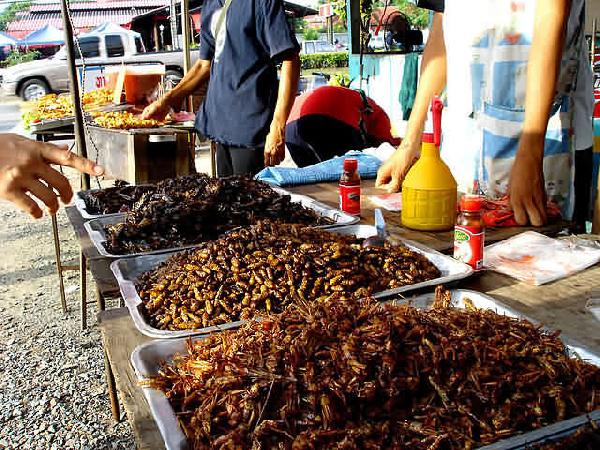Beware exotic food
Beware exotic food
When traveling to exotic countries, tourists are often offered to taste outlandish dishes that can be prepared from poisonous animals and pose a health hazard.

The main "ingredient" of this dish is the eggs of the giant black ants lyometopum, which belong to the species of poisonous insects and live in the roots of the agave. Ant eggs appear in Mexican markets in early summer, as that is when the ants crawl out to the surface of the earth. Ant eggs, similar in appearance to pine nuts, are often stewed with poisonous ants, and this is the greatest danger for tourists. Even if you were offered escamoles in one of the restaurants, it is better to refuse such food.
It would seem that what could be dangerous in a hard-boiled duck egg? Before you try this "delicacy", it will not be superfluous to find out some nuances. In some countries of Southeast Asia, there are special farms where duck eggs “ripen” in incubators. The most valuable are eggs that have been in the incubator for 18 days, that is, with a formed chick. The egg is boiled, the liquid is poured out of it, fish or soy sauce is added, vinegar is poured over and eaten. Given the fact that inside the 18-day-old egg is a chick with legs and feathers, the balut dish, even with a big stretch, cannot be called acceptable food for European tourists.
A-ping is a Cambodian dish made from the poisonous tarantula of the same name. Spiders the size of a man's hand have their poisonous fangs removed and cooked over an open fire until the shell turns a reddish-brown hue. This dish could even be called healthy because of the large amount of protein and lack of fat. However, there is simply no guarantee that the cook has carefully removed the poisonous fangs of the tarantula.
Iceland does not belong to exotic countries, but in its national cuisine there is one delicacy dish from Greenland shark meat - harkal. The raw meat of this marine predator contains a large amount of urea and causes severe poisoning. Shark meat is buried in the ground for 6-7 weeks, then allowed to dry and hung in a dark, ventilated room for 4 months. Then the rotten and foul-smelling meat is cut and the middle of the yellowish tint is separated, from which the dish is actually prepared. If the preparation technology is violated, the meat of the Greenland shark causes severe poisoning in humans, up to death.
Call tel. 068-552-29-29
Send wishes to info.travelself @gmail.com

mexican dish escamoles
The main "ingredient" of this dish is the eggs of the giant black ants lyometopum, which belong to the species of poisonous insects and live in the roots of the agave. Ant eggs appear in Mexican markets in early summer, as that is when the ants crawl out to the surface of the earth. Ant eggs, similar in appearance to pine nuts, are often stewed with poisonous ants, and this is the greatest danger for tourists. Even if you were offered escamoles in one of the restaurants, it is better to refuse such food.
Southeast Asia: balut dish
It would seem that what could be dangerous in a hard-boiled duck egg? Before you try this "delicacy", it will not be superfluous to find out some nuances. In some countries of Southeast Asia, there are special farms where duck eggs “ripen” in incubators. The most valuable are eggs that have been in the incubator for 18 days, that is, with a formed chick. The egg is boiled, the liquid is poured out of it, fish or soy sauce is added, vinegar is poured over and eaten. Given the fact that inside the 18-day-old egg is a chick with legs and feathers, the balut dish, even with a big stretch, cannot be called acceptable food for European tourists.
Cambodian dish a-ping
A-ping is a Cambodian dish made from the poisonous tarantula of the same name. Spiders the size of a man's hand have their poisonous fangs removed and cooked over an open fire until the shell turns a reddish-brown hue. This dish could even be called healthy because of the large amount of protein and lack of fat. However, there is simply no guarantee that the cook has carefully removed the poisonous fangs of the tarantula.
Iceland: Harkal dish
Iceland does not belong to exotic countries, but in its national cuisine there is one delicacy dish from Greenland shark meat - harkal. The raw meat of this marine predator contains a large amount of urea and causes severe poisoning. Shark meat is buried in the ground for 6-7 weeks, then allowed to dry and hung in a dark, ventilated room for 4 months. Then the rotten and foul-smelling meat is cut and the middle of the yellowish tint is separated, from which the dish is actually prepared. If the preparation technology is violated, the meat of the Greenland shark causes severe poisoning in humans, up to death.
Call tel. 068-552-29-29
Send wishes to info.travelself @gmail.com
<< Interesting facts.. >>

 Helpful information
Helpful information

